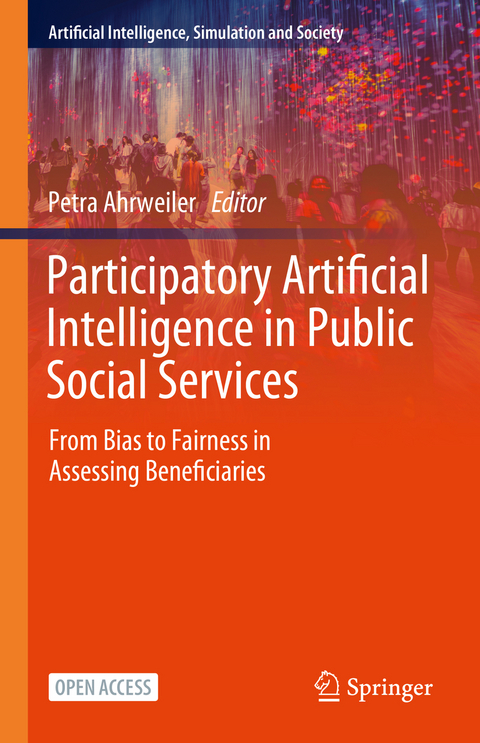
Participatory Artificial Intelligence in Public Social Services
Springer International Publishing (Verlag)
978-3-031-71677-5 (ISBN)
- Noch nicht erschienen - erscheint am 10.03.2025
- Versandkostenfrei innerhalb Deutschlands
- Auch auf Rechnung
- Verfügbarkeit in der Filiale vor Ort prüfen
- Artikel merken
This open access edited volume focuses on fairness issues concerning the use of artificial intelligence (AI) for social service provision in national welfare systems. With this, it touches upon important questions in the innovation agenda of countries across continents about the ethics, justice, quality, responsibility, accountability, and transparency to use AI for state functions. The volume shows that in many countries, AI, or at least data analytics methods, are already in place to support the assessment of beneficiaries for deciding on the value criteria to distinguish between legal /fraudulent, deserving/non-deserving, or needy/non-needy recipients. The book provides a cross-cultural comparison of AI-based social assessment among national welfare systems of 9 countries across 4 continents: Spain, Estonia, Germany, Iran, India, Nigeria, Ukraine, China and USA. Based on participatory research results from multi-stakeholder inputs, especially those from vulnerable groups, the chapters in this volume show that value criteria for fairness and social justice are context-bound and vary across the globe. Furthermore, they are in constant flux, aligned to social change. Thus, the volume looks at pathways to developing culture-sensitive, responsive and participatory AI for social assessment in public service provision. The contributions are interdisciplinary and introduce perspectives from the fields of sociology, computational social science, computer science and public policy. This topical volume is of interest to a wide readership.
Petra Ahrweiler (Prof, Dr) is Full Professor of Sociology of Technology and Innovation, Social Simulation, at Johannes Gutenberg University Mainz, Germany since 2013. She was on leave until 2017 to work as Director and CEO at the EA European Academy of Technology and Innovation Assessment in Bad Neuenahr-Ahrweiler, Germany, until 2017. Previously, she was Full Professor of Technology and Innovation Management at Michael Smurfit School of Business, University College Dublin, Ireland, and Director of its Innovation Research Unit. She was also a research fellow of the Engineering Systems Division at Massachusetts Institute of Technology. She started her professional career by studying social sciences at the University of Hamburg, Germany. At the Free University Berlin, Germany, she received her PhD for a study on artificial intelligence, and got her habilitation at the University of Bielefeld, Germany, for a study on simulation in Science and Technology Studies. Petra won various research prizes, has long experience in coordinating and completing international, mostly European research projects, publishes inter-disciplinarily in international journals, and has been awarded fellowships of various scientific societies such as the German Academy of Technical Sciences (acatech), and AcademiaNet, the network of excellent female scientists in Germany.
Using a Case Study Approach for Investigating the Status Quo and Future Options of AI-based Social Assessment in Public Service Provision.- Inclusive Technology Co-Design for Participatory AI.- Ethical Aspects of Research on AI-based Social Assessment.- Participatory Action Research for AI in Social Services: An Example of Local Practices from Catalonia.- Specialists and Algorithms: Implementation of AI in the Delivery of Unemployment Services in Estonia.- AI Use in the Asylum Procedure in Germany: Exploring Perspectives with Refugees and Supporters on Assessment Criteria and Beyond.- Social Assessment for the Targeted Subsidies Plan as a Social Service Provision in Iran: AI Application in the Targeted Subsidies Plan.- Social Assessment and Cultural Resistance: The Public Distribution System in Tamil Nadu, India.- The Role of AI in Effective Social Protection Delivery: The National Cash Transfer Programme in Nigeria.- The Potential of Artificial Intelligence in the Assessment of System of Social Integration of Veterans of the Russian-Ukrainian War.- Assessment for AI in Social Services: Community Virtual Nursing Home in Shanghai, China.- AI Integration in Mental Health Services: Examining Trends in the US and Peoria, Illinois.- Towards Culture-Sensitive, Responsive and Participatory AI.
| Erscheint lt. Verlag | 10.3.2025 |
|---|---|
| Reihe/Serie | Artificial Intelligence, Simulation and Society |
| Zusatzinfo | VIII, 312 p. 32 illus., 25 illus. in color. |
| Verlagsort | Cham |
| Sprache | englisch |
| Maße | 155 x 235 mm |
| Themenwelt | Sozialwissenschaften ► Soziologie ► Spezielle Soziologien |
| Schlagworte | Chinese Social Credit System • data analytics in Nigerian policy • open access • psychoanalytic experience • social assessment in the US education system • static and genetic phenomenology • systematizing religion • technology-based social assessment • technology-governed job market |
| ISBN-10 | 3-031-71677-9 / 3031716779 |
| ISBN-13 | 978-3-031-71677-5 / 9783031716775 |
| Zustand | Neuware |
| Haben Sie eine Frage zum Produkt? |
aus dem Bereich


